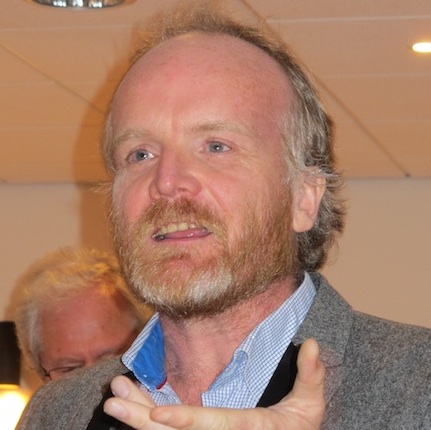- Level Foundation
- المدة 23 ساعات hours
- الطبع بواسطة Universiteit Leiden
-
Offered by

عن
Everywhere, every day, everybody uses language. There is no human society, no matter how small or how isolated, which does not employ a language that is rich and diverse. This course introduces you to linguistics, featuring interviews with well-known linguists and with speakers of many different languages. Join us to explore the miracles of human language! The Miracles of Human Language introduces you to the many-faceted study of languages, which has amazed humans since the beginning of history. Together with speakers of many other languages around the world, as well as with famous linguists such as Noam Chomsky and Adele Goldberg, you will learn to understand and analyse how your native tongue is at the same time similar and different from many other languages. You will learn the basic concepts of linguistics, get to know some of the key features of big and small languages and get insight into what linguists do. This course gives an introduction into the study of languages, the field of linguistics. With the support of the basic linguistic terminology that is offered in the course, you will soon be able to comment both on variety between languages, as well as on a single language's internal structure. Anyone who wishes to understand how languages work, and how they can give us insight into the human mind is very welcome to join. The course is useful if you want to get a fairly quick introduction into linguistics, for instance because you are considering studying it further, or because you are interested in a neighbouring discipline such as psychology, computer science or anthropology. Furthermore, the course will help you develop analytical skills. If you are curious to understand how language works and how it gives insight into the human mind, this course is definitely for you!
الوحدات
Introduction
1
Discussions
- Introduce yourself
2
Videos
- Welcome to the Miracles of Human Language!
- How to succeed in your online class?
1
Readings
- Meet the instructor & his team
Introduction to Linguistics
3
Discussions
- Language and identity in groups
- Language diversity is a diversity of minds?
- In what ways are unrelated languages similar?
6
Videos
- Human Language and Animal Communication Systems
- Human Language Versus Other 'Languages'
- Discussion with Marten and Inge: Language Diversity
- Language Diversity and Ethnologue
- Discussion with Marten and Inge: What do Linguists do?
- Interview with Dr. Victoria Nyst
2
Readings
- Registration Ethnologue
- Required and optional readings
Language informants
6
Videos
- Introduction language informants + introducing Han Hu, Speaker of Mandarin Chinese
- Introducing Roberta D'Alessandro, speaker of Abruzzese
- Introducing Khalid Mourigh, speaker of Tarifit Berber
- Introducing Varun DeCastro-Arrazola, speaker of Basque
- Introducing Beste Sevindik, speaker of Turkish
- Introducing Enoch Aboh, speaker of Gungbe
Concluding the module
1
Assignment
- Test your knowledge 1
1
Videos
- Conclusion; language and dialect
The study of sound: Phonology and Phonetics
1
Discussions
- What was your first word?
6
Videos
- Distinguishing consonants
- Production of speech sounds
- Discussion with Marten and Inge: consonants of world languages
- Sounds in systems
- Discussion with Marten and Inge: sounds and language change
- Interview with Prof. dr. Claartje Levelt
1
Readings
- Required and optional readings
Language informants
6
Videos
- Introduction + Tarifit Berber
- Gungbe
- Turkish
- Abruzzese
- Mandarin Chinese
- Basque
Concluding the module
1
Assignment
- Test your knowledge 2
1
Videos
- Conclusion; sounds and gestures
The study of words and sentences: Morphology and syntax
2
Discussions
- Words, sentences and translation
- On the nature of affixes
7
Videos
- Words and sentences
- Morphology
- Discussion with Marten and Inge: world of words
- Syntax and word order (a)
- Syntax and word order (b)
- Discussion with Marten and Inge: world of word order
- Interview with Prof. Noam Chomsky
1
Readings
- Required and optional readings
Language informants
6
Videos
- Introduction + Basque
- Tarifit Berber
- Gungbe
- Turkish
- Abruzzese
- Mandarin Chinese
Concluding the module
1
Assignment
- Test your knowledge 3
1
Videos
- Conclusion; structure beyond sentences
peer graded assignment 1
1
Peer Review
- World of word order
The study of meaning: Pragmatics and Semantics
2
Discussions
- Having no fixed description, how do we recognize objects?
- Unintentionally broken promises and Grice
6
Videos
- Layers of meaning
- Semantics
- Discussion with Marten and Inge: color and snow
- Pragmatics
- Discussion with Marten and Inge: changing the world with sentences
- Interview with Barend Beekhuizen MA
1
Readings
- Required and optional readings
Language informants
6
Videos
- Introduction + Abruzzese
- Tarifit Berber
- Turkish
- Basque
- Mandarin Chinese
- Gungbe
Concluding the module
1
Assignment
- Test your knowledge 4
1
Videos
- Conclusion; untranslatable words?
1
Readings
- Quiz readings
Language in the Brain
2
Discussions
- Everyday mistakes: blending
- Reading and writing with Aphasia
6
Videos
- Introduction
- Aphasia
- Discussion with Marten and Inge: everyday mistakes and the Foreign Accent Syndrome
- Reading in the brain
- Visiting the lab
- Interview with Prof. Dr. Niels Schiller
2
Readings
- Required and optional readings
- Crowdfunding credits
Language informants
4
Videos
- Introduction + Turkish
- Tarifit Berber
- Abruzzese
- Basque
Concluding the module
1
Assignment
- Test your knowledge 5
1
Videos
- Conclusion; dyslexia
Language in the Society
2
Discussions
- More on (the nature of) linguistic change
- The case of linguistic variation and Esperanto
6
Videos
- Language change and variation
- Social stratification
- Discussion with Marten and Inge: social variables
- Politeness
- Discussion with Marten and Inge: examples of Face
- Interview with Prof. Adele Goldberg
1
Readings
- Required and optional readings
Language informants
6
Videos
- Introduction + Gungbe
- Tarifit Berber
- Turkish
- Abruzzese
- Mandarin Chinese
- Basque
Concluding the module
1
Assignment
- Test your knowledge 6
1
Videos
- Conclusion; how personal are politeness strategies?
Concluding the course
1
Assignment
- Final exam
peer graded assignment 2
1
Peer Review
- Face and Politeness
Auto Summary
Unlock the fascinating world of linguistics with "Miracles of Human Language: An Introduction to Linguistics," a comprehensive course offered through Coursera. Dive into the realm of human language, a universal and intricate aspect of human society, guided by prominent linguists like Noam Chomsky and Adele Goldberg. This foundational course in the domain of personal development provides an engaging introduction to linguistics. It covers the basic concepts of the field, explores the diversity and commonality among global languages, and offers insights into the work of linguists. Through interviews and interactions with native speakers of various languages, you'll gain a deeper understanding of how language functions and its significance in our lives. Ideal for those considering further study in linguistics or related disciplines such as psychology, computer science, or anthropology, this course also helps develop critical analytical skills. With a total duration of 1380 minutes, it is designed to offer a thorough yet accessible overview suitable for beginners. Subscribe through either the Professional or Starter options to begin your journey into the miracles of human language. Whether you're a curious learner, a budding linguist, or someone interested in the cognitive aspects of language, this course will provide valuable insights and a solid foundation in linguistics. Join us and discover how language reveals the intricacies of the human mind.

Marc van Oostendorp


